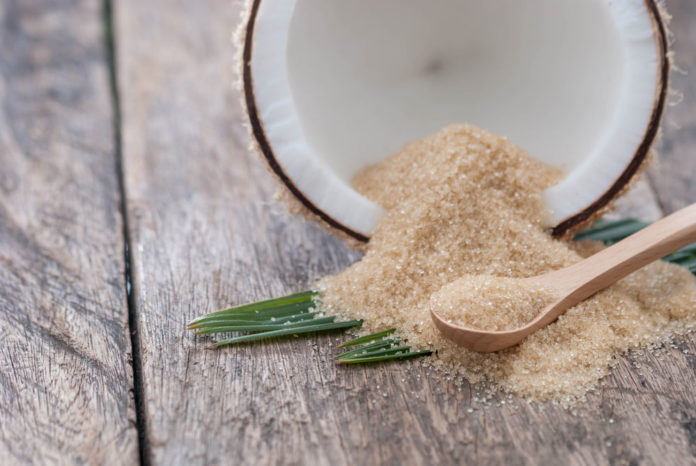What Is Coconut Sugar?
Coconut sugar is exactly as the name insinuates, a sugar created from the sap of the coconut tree. Is often used interchangeably with coconut palm sugar and commonly confused with palm sugar. And though coconut and palm sugars are similar in nature, palm sugar is actually produced from a different variety of palm tree. After the sap has been collected, it is heated under high temperature to evaporate most of the water, leaving sugar granules similar to brown sugar. The sugar is then utilized and incorporated into food products to offer sweetness and texture desirability.
Coconut Sugar Nutrition
Coconut sugar’s nutrition resembles standard table or granulated sugar (also known as sucrose), offering 15 calories per one teaspoon (4 grams). It is nothing more than a pure carbohydrate source, containing four grams of total carb and sugar per serving. But unlike refined, white sugar, coconut sugar is hinted to retain more nutrients related to minimal processing it undergoes. It may contain powerful antioxidants and minerals, including zinc, iron, calcium, and potassium.
Why Use Coconut Sugar?
Natural Sweetener
Though sugar is sugar, utilizing a natural sugar may be more beneficial. In fact, coconut sugar’s users propose it easily replaces granulated, white sugar in the majority of recipes without compromising or affecting the anticipated flavor or texture. Its production is essentially harmless, devoid of extensive treatment, handling, and harsh chemicals.
Lower Glycemic Index
Compared to granulated and table sugar, coconut sugar is suggested to have a lower glycemic index (GI). Glycemic index is essentially a blood sugar meter, indicating how foods impact blood sugar or glucose response relative to a standard glucose solution – low GI foods are less likely to spike blood sugars while high blood sugars are known to spike them. Coconut sugar is proposed to have a GI of 35, while common table sugar with a GI of 58, conducive to tighter blood glucose control, particularly in diabetics.
Valuable Sugar Substitute
Its vitamin and mineral content paired with its lower GI prizes coconut sugar to be a valuable sugar substitute, especially when rivaled against white sugar. Additionally, its neutral taste allows it to equilibrate and resemble sugar mostly identified in standard recipes.
Sustainable
Its advocates esteem coconut sugar as a sustainable product, or displaying the ability to sustain or maintain oneself now, without jeopardizing or harming the futures generational need to do so later on. Coconut palm trees are widely present in warmer climate areas and proposed to be waiting to become harvested. Ultimately, utilizing the coconut tree for sap and sugar is supported to not harm the tree itself or environment.
Is Coconut Sugar a Healthy Sugar?
Though coconut sugar holds great usefulness as indicated above – acting as a natural sweetener, offering a lower GI, and noted as sustainable – it is important to remember one thing: Sugar is still sugar. Yes, more natural sugars and lower GI foods are encouraged over refined, processed sugars. But coconut sugar, like all sugars, should be consumed in moderation, particularly when considering the typical sugar quantity consumed compared to the recommended guidelines. The average American is suggested to consume approximately 19.5 teaspoons (82 grams) of sugar each day. Putting those numbers into comparison, the American Heart Association encourages men to consume no more than 38 grams (9 teaspoons) of added sugar each day, while women should keep it limited to 25 grams (6 teaspoons). And even in the presence or absence of nutrients, too much sugar (of any type) can contribute to weight gain and chronic disease.
Reference:
Coconut Palm Sugar. American Diabetes Association.






